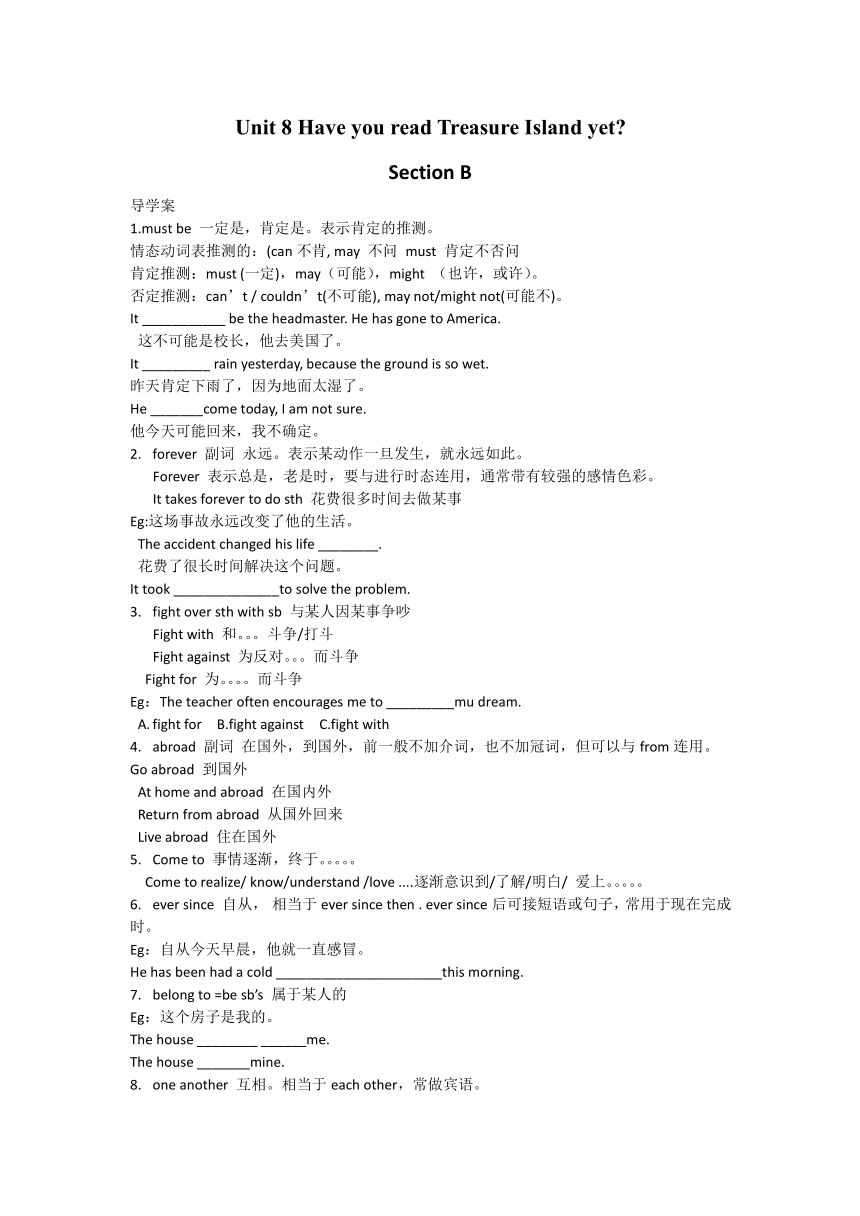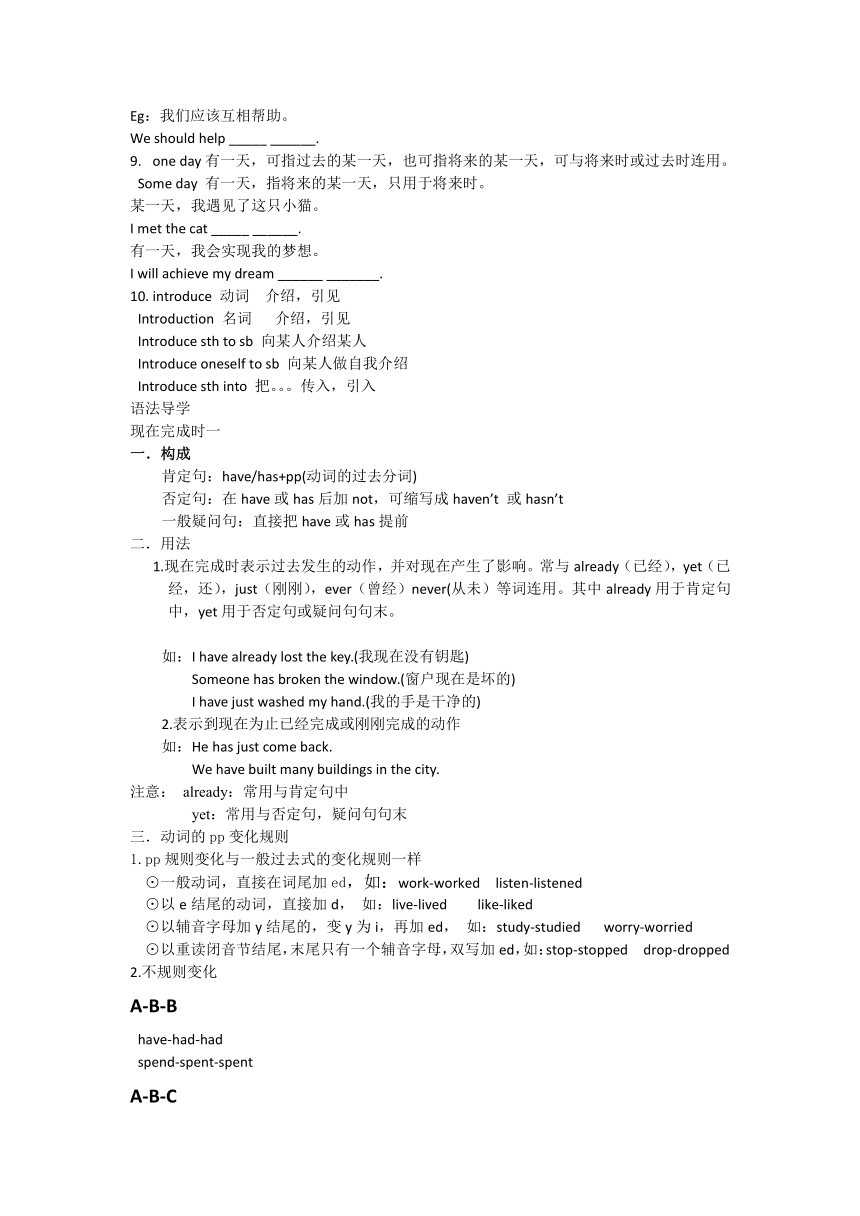人教新目标版八年级下册Unit 8 Have you read Treasure Island yet? Section B英语讲义(含答案)
文档属性
| 名称 | 人教新目标版八年级下册Unit 8 Have you read Treasure Island yet? Section B英语讲义(含答案) |

|
|
| 格式 | zip | ||
| 文件大小 | 28.5KB | ||
| 资源类型 | 教案 | ||
| 版本资源 | 人教新目标(Go for it)版 | ||
| 科目 | 英语 | ||
| 更新时间 | 2020-06-17 19:01:13 | ||
图片预览


文档简介
Unit
8
Have
you
read
Treasure
Island
yet?
Section
B
导学案
1.must
be
一定是,肯定是。表示肯定的推测。
情态动词表推测的:(can不肯,
may
不问
must
肯定不否问
肯定推测:must
(一定),may(可能),might
(也许,或许)。
否定推测:can’t
/
couldn’t(不可能),
may
not/might
not(可能不)。
It
___________
be
the
headmaster.
He
has
gone
to
America.
这不可能是校长,他去美国了。
It
_________
rain
yesterday,
because
the
ground
is
so
wet.
昨天肯定下雨了,因为地面太湿了。
He
_______come
today,
I
am
not
sure.
他今天可能回来,我不确定。
2.
forever
副词
永远。表示某动作一旦发生,就永远如此。
Forever
表示总是,老是时,要与进行时态连用,通常带有较强的感彩。
It
takes
forever
to
do
sth
花费很多时间去做某事
Eg:这场事故永远改变了他的生活。
The
accident
changed
his
life
________.
花费了很长时间解决这个问题。
It
took
______________to
solve
the
problem.
3.
fight
over
sth
with
sb
与某人因某事争吵
Fight
with
和。。。斗争/打斗
Fight
against
为反对。。。而斗争
Fight
for
为。。。。而斗争
Eg:The
teacher
often
encourages
me
to
_________mu
dream.
A.
fight
for
B.fight
against
C.fight
with
4.
abroad
副词
在国外,到国外,前一般不加介词,也不加冠词,但可以与from连用。
Go
abroad
到国外
At
home
and
abroad
在国内外
Return
from
abroad
从国外回来
Live
abroad
住在国外
5.
Come
to
事情逐渐,终于。。。。。
Come
to
realize/
know/understand
/love
....逐渐意识到/了解/明白/
爱上。。。。。
6.
ever
since
自从,
相当于ever
since
then
.
ever
since后可接短语或句子,常用于现在完成时。
Eg:自从今天早晨,他就一直感冒。
He
has
been
had
a
cold
______________________this
morning.
7.
belong
to
=be
sb’s
属于某人的
Eg:这个房子是我的。
The
house
________
______me.
The
house
_______mine.
8.
one
another
互相。相当于each
other,常做宾语。
Eg:我们应该互相帮助。
We
should
help
_____
______.
9.
one
day有一天,可指过去的某一天,也可指将来的某一天,可与将来时或过去时连用。
Some
day
有一天,指将来的某一天,只用于将来时。
某一天,我遇见了这只小猫。
I
met
the
cat
_____
______.
有一天,我会实现我的梦想。
I
will
achieve
my
dream
______
_______.
10.
introduce
动词
介绍,引见
Introduction
名词
介绍,引见
Introduce
sth
to
sb
向某人介绍某人
Introduce
oneself
to
sb
向某人做自我介绍
Introduce
sth
into
把。。。传入,引入
语法导学
现在完成时一
一.构成
肯定句:have/has+pp(动词的过去分词)
否定句:在have或has后加not,可缩写成haven’t
或hasn’t
一般疑问句:直接把have或has提前
二.用法
1.现在完成时表示过去发生的动作,并对现在产生了影响。常与already(已经),yet(已经,还),just(刚刚),ever(曾经)never(从未)等词连用。其中already用于肯定句中,yet用于否定句或疑问句句末。
如:I
have
already
lost
the
key.(我现在没有钥匙)
Someone
has
broken
the
window.(窗户现在是坏的)
I
have
just
washed
my
hand.(我的手是干净的)
2.表示到现在为止已经完成或刚刚完成的动作
如:He
has
just
come
back.
We
have
built
many
buildings
in
the
city.
注意:
already:常用与肯定句中
yet:常用与否定句,疑问句句末
三.动词的pp变化规则
1.pp规则变化与一般过去式的变化规则一样
⊙一般动词,直接在词尾加ed,如:work-worked
listen-listened
⊙以e结尾的动词,直接加d,
如:live-lived
like-liked
⊙以辅音字母加y结尾的,变y为i,再加ed,
如:study-studied
worry-worried
⊙以重读闭音节结尾,末尾只有一个辅音字母,双写加ed,如:stop-stopped
drop-dropped
2.不规则变化
A-B-B
have-had-had
spend-spent-spent
A-B-C
take-took-taken
speak-spoke-spoken
A-A-A
cut-cut
_-cut
put-put-put
一.选用have,
has填空:
1.?I
_______
told
him
the
news.
2.?She
_______
come
back
from
school.
3.?You
_______
won
the
game.
4.?They
have
bought
a
computer.
(改成否定句)
??
?_________________________________________
5.?He
has
lost
his
book.
(先改成一般疑问句,再作肯定与否定回答)
??
?—
______________________
—?______________________
6.She
has
already
finished
his
homework.(改为一般疑问句和否定句)
____________________________________________?
_____________________________________________.
7.We
haven’t
received
his
letter
yet.(变为肯定句)
_______________________________________
二.翻译
1.Jim刚刚失业了。Jim
________
__________
________his
job.
2.我刚刚收到一封信。I
__________
__________
___________a
letter.
3.我已经给他打过电话了。I
__________
_________
________him.
4.他还不知道这件事。He________
__________this
___________.
5.你已经吃过早餐了吗?__________you
___________your
breakfast
________?
三.用never,
ever,
already,
just,
yet,填空
1.
I
have
_______
seen
him
before,
so
I
have
no
idea
about
him.
2.
Jack
has
_________
finished
his
homework.
3.
“Have
you
________
seen
the
film?”
“No,
I
have
________
seen
it.”
4.
“Has
the
bus
left
_______?”
“Yes,
it
has
_________
left.”
词组积累
1.
fight
over/about
sth
with
sb_______________
2.
come
to
know/realize/understand/like/love.._______________
3.
country
music_______________4.be
forever
doing_______________
5.take
forever
_______________6.go
abroad
_______________
7.
study
abroad_______________8.ever
since_______________
9.modern
society
_______________
10.belong
to
sb=be
sb's_______________
11.one
another=each
other_______________
12.the
beauty
of
nature_______________
13.keep
a
record_______________
14.break
a
record_______________
15.introduce
sb/sth
to
sb_______________
16.introduce
oneself
to
_______________
17.introduce
sth
into
_______________
18.an
island
full
of
treasures_______________
19.bring
back_______________
20.not
long
after
that_______________
21.leave
。。。behind
_______________
22.better
understand
sth=understand
sth
better_______________
23.sing
live_______________
句型积累
1.
他在国外学习期间,他听到了一首充满思乡之情的歌。
________________________________________________
2.
那些人们彼此友善,互相信任的美好旧时光。
________________________________________________
3.
我希望有一天我可以看他现场演唱。
_________________________________________________
4.
我还没有去过中国。
___________________________________________________
答案
导学案
1.
can’t
,
must,
may
2.forever,
forever
3.A
6.ever
since
7.belongs
to,
is
8.one
another,/each
other
9.one
day
,
one
day/some
day
语法导学
一.1.have
2.has
3.have
4.They
haven’t
bought
a
computer.
5.Has
he
lost
his
book?Yes,
he
has./No,
he
hasn’t
.6.
She
hasn’t
finished
his
homework
yet.
7.
We
have
already
received
his
letter.
2.
1.
has
just
lost
2.
have
just
received
3.
have
already
received
4.
hasn’t
known
yet
5.
Have
eaten
yet
3.
1.never
2.
already
3.
ever,
never
4.
yet,
already
词组积累
1.
因某事与某人争吵
2.逐渐地,慢慢地终于知道/意识到/明白/喜欢/喜爱。。。3.乡村音乐
4.
总是做某事5.
花费很多时间6.
出国
7.在国外学习
8.自从
9.现代社会10.属于某人的
11.彼此,互相
12.大自然的美丽13.保持记录
14.打破记录15.向某人介绍某人或某物
16.
向。。。做自我介绍
17.
把。。传入/引进
18.
充满珠宝的一座岛
19.带回来
20.那之后不久
21.
把。。。留下
22.更好地理解。。。。。23.现场演唱
句型积累
1.While
he
was
studying
abroad,
he
heard
a
song
full
of
feelings
about
returning
home.
2.The
good
old
days
when
people
were
kind
to
each
other
and
trusted
one
another.
3.I
hope
to
see
him
sing
live
one
day.
4.I
haven’t
been
to
China
yet.
8
Have
you
read
Treasure
Island
yet?
Section
B
导学案
1.must
be
一定是,肯定是。表示肯定的推测。
情态动词表推测的:(can不肯,
may
不问
must
肯定不否问
肯定推测:must
(一定),may(可能),might
(也许,或许)。
否定推测:can’t
/
couldn’t(不可能),
may
not/might
not(可能不)。
It
___________
be
the
headmaster.
He
has
gone
to
America.
这不可能是校长,他去美国了。
It
_________
rain
yesterday,
because
the
ground
is
so
wet.
昨天肯定下雨了,因为地面太湿了。
He
_______come
today,
I
am
not
sure.
他今天可能回来,我不确定。
2.
forever
副词
永远。表示某动作一旦发生,就永远如此。
Forever
表示总是,老是时,要与进行时态连用,通常带有较强的感彩。
It
takes
forever
to
do
sth
花费很多时间去做某事
Eg:这场事故永远改变了他的生活。
The
accident
changed
his
life
________.
花费了很长时间解决这个问题。
It
took
______________to
solve
the
problem.
3.
fight
over
sth
with
sb
与某人因某事争吵
Fight
with
和。。。斗争/打斗
Fight
against
为反对。。。而斗争
Fight
for
为。。。。而斗争
Eg:The
teacher
often
encourages
me
to
_________mu
dream.
A.
fight
for
B.fight
against
C.fight
with
4.
abroad
副词
在国外,到国外,前一般不加介词,也不加冠词,但可以与from连用。
Go
abroad
到国外
At
home
and
abroad
在国内外
Return
from
abroad
从国外回来
Live
abroad
住在国外
5.
Come
to
事情逐渐,终于。。。。。
Come
to
realize/
know/understand
/love
....逐渐意识到/了解/明白/
爱上。。。。。
6.
ever
since
自从,
相当于ever
since
then
.
ever
since后可接短语或句子,常用于现在完成时。
Eg:自从今天早晨,他就一直感冒。
He
has
been
had
a
cold
______________________this
morning.
7.
belong
to
=be
sb’s
属于某人的
Eg:这个房子是我的。
The
house
________
______me.
The
house
_______mine.
8.
one
another
互相。相当于each
other,常做宾语。
Eg:我们应该互相帮助。
We
should
help
_____
______.
9.
one
day有一天,可指过去的某一天,也可指将来的某一天,可与将来时或过去时连用。
Some
day
有一天,指将来的某一天,只用于将来时。
某一天,我遇见了这只小猫。
I
met
the
cat
_____
______.
有一天,我会实现我的梦想。
I
will
achieve
my
dream
______
_______.
10.
introduce
动词
介绍,引见
Introduction
名词
介绍,引见
Introduce
sth
to
sb
向某人介绍某人
Introduce
oneself
to
sb
向某人做自我介绍
Introduce
sth
into
把。。。传入,引入
语法导学
现在完成时一
一.构成
肯定句:have/has+pp(动词的过去分词)
否定句:在have或has后加not,可缩写成haven’t
或hasn’t
一般疑问句:直接把have或has提前
二.用法
1.现在完成时表示过去发生的动作,并对现在产生了影响。常与already(已经),yet(已经,还),just(刚刚),ever(曾经)never(从未)等词连用。其中already用于肯定句中,yet用于否定句或疑问句句末。
如:I
have
already
lost
the
key.(我现在没有钥匙)
Someone
has
broken
the
window.(窗户现在是坏的)
I
have
just
washed
my
hand.(我的手是干净的)
2.表示到现在为止已经完成或刚刚完成的动作
如:He
has
just
come
back.
We
have
built
many
buildings
in
the
city.
注意:
already:常用与肯定句中
yet:常用与否定句,疑问句句末
三.动词的pp变化规则
1.pp规则变化与一般过去式的变化规则一样
⊙一般动词,直接在词尾加ed,如:work-worked
listen-listened
⊙以e结尾的动词,直接加d,
如:live-lived
like-liked
⊙以辅音字母加y结尾的,变y为i,再加ed,
如:study-studied
worry-worried
⊙以重读闭音节结尾,末尾只有一个辅音字母,双写加ed,如:stop-stopped
drop-dropped
2.不规则变化
A-B-B
have-had-had
spend-spent-spent
A-B-C
take-took-taken
speak-spoke-spoken
A-A-A
cut-cut
_-cut
put-put-put
一.选用have,
has填空:
1.?I
_______
told
him
the
news.
2.?She
_______
come
back
from
school.
3.?You
_______
won
the
game.
4.?They
have
bought
a
computer.
(改成否定句)
??
?_________________________________________
5.?He
has
lost
his
book.
(先改成一般疑问句,再作肯定与否定回答)
??
?—
______________________
—?______________________
6.She
has
already
finished
his
homework.(改为一般疑问句和否定句)
____________________________________________?
_____________________________________________.
7.We
haven’t
received
his
letter
yet.(变为肯定句)
_______________________________________
二.翻译
1.Jim刚刚失业了。Jim
________
__________
________his
job.
2.我刚刚收到一封信。I
__________
__________
___________a
letter.
3.我已经给他打过电话了。I
__________
_________
________him.
4.他还不知道这件事。He________
__________this
___________.
5.你已经吃过早餐了吗?__________you
___________your
breakfast
________?
三.用never,
ever,
already,
just,
yet,填空
1.
I
have
_______
seen
him
before,
so
I
have
no
idea
about
him.
2.
Jack
has
_________
finished
his
homework.
3.
“Have
you
________
seen
the
film?”
“No,
I
have
________
seen
it.”
4.
“Has
the
bus
left
_______?”
“Yes,
it
has
_________
left.”
词组积累
1.
fight
over/about
sth
with
sb_______________
2.
come
to
know/realize/understand/like/love.._______________
3.
country
music_______________4.be
forever
doing_______________
5.take
forever
_______________6.go
abroad
_______________
7.
study
abroad_______________8.ever
since_______________
9.modern
society
_______________
10.belong
to
sb=be
sb's_______________
11.one
another=each
other_______________
12.the
beauty
of
nature_______________
13.keep
a
record_______________
14.break
a
record_______________
15.introduce
sb/sth
to
sb_______________
16.introduce
oneself
to
_______________
17.introduce
sth
into
_______________
18.an
island
full
of
treasures_______________
19.bring
back_______________
20.not
long
after
that_______________
21.leave
。。。behind
_______________
22.better
understand
sth=understand
sth
better_______________
23.sing
live_______________
句型积累
1.
他在国外学习期间,他听到了一首充满思乡之情的歌。
________________________________________________
2.
那些人们彼此友善,互相信任的美好旧时光。
________________________________________________
3.
我希望有一天我可以看他现场演唱。
_________________________________________________
4.
我还没有去过中国。
___________________________________________________
答案
导学案
1.
can’t
,
must,
may
2.forever,
forever
3.A
6.ever
since
7.belongs
to,
is
8.one
another,/each
other
9.one
day
,
one
day/some
day
语法导学
一.1.have
2.has
3.have
4.They
haven’t
bought
a
computer.
5.Has
he
lost
his
book?Yes,
he
has./No,
he
hasn’t
.6.
She
hasn’t
finished
his
homework
yet.
7.
We
have
already
received
his
letter.
2.
1.
has
just
lost
2.
have
just
received
3.
have
already
received
4.
hasn’t
known
yet
5.
Have
eaten
yet
3.
1.never
2.
already
3.
ever,
never
4.
yet,
already
词组积累
1.
因某事与某人争吵
2.逐渐地,慢慢地终于知道/意识到/明白/喜欢/喜爱。。。3.乡村音乐
4.
总是做某事5.
花费很多时间6.
出国
7.在国外学习
8.自从
9.现代社会10.属于某人的
11.彼此,互相
12.大自然的美丽13.保持记录
14.打破记录15.向某人介绍某人或某物
16.
向。。。做自我介绍
17.
把。。传入/引进
18.
充满珠宝的一座岛
19.带回来
20.那之后不久
21.
把。。。留下
22.更好地理解。。。。。23.现场演唱
句型积累
1.While
he
was
studying
abroad,
he
heard
a
song
full
of
feelings
about
returning
home.
2.The
good
old
days
when
people
were
kind
to
each
other
and
trusted
one
another.
3.I
hope
to
see
him
sing
live
one
day.
4.I
haven’t
been
to
China
yet.
同课章节目录
- Unit 1 What's the matter?
- Section A
- Section B
- Unit 2 I'll help to clean up the city parks.
- Section A
- Section B
- Unit 3 Could you please clean your room?
- Section A
- Section B
- Unit 4 Why don't you talk to your parents?
- Section A
- Section B
- Unit 5 What were you doing when the rainstorm came
- Section A
- Section B
- Review of Units 1-5
- Unit 6 An old man tried to move the mountains.
- Section A
- Section B
- Unit 7 What's the highest mountain in the world?
- Section A
- Section B
- Unit 8 Have you read Treasure Island yet?
- Section A
- Section B
- Unit 9 Have you ever been to a museum?
- Section A
- Section B
- Unit 10 I've had this bike for three years.
- Section A
- Section B
